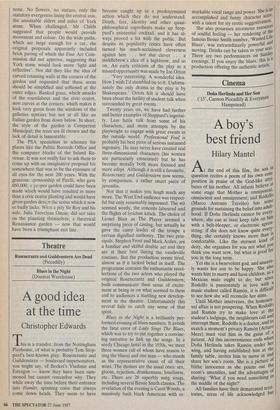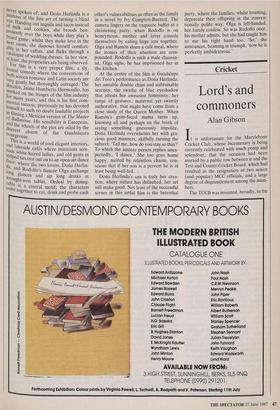Cinema
Dona Herlinda and Her Son (`15', Cannon Piccadilly & Everyman Hampstead)
A boy's best friend
Hilary Mantel
At the end of this film, the sun in question recites a poem of his own coin- position in praise of the God-like attri- butes of his mother. All infants believe at some stage that Mother is omnipotent, omniscient and omnipresent; and Rodolfo (Marco Antonio Trevifio) has some grounds for sustaining the belief into adult- hood. If Doila Herlinda cannot be every' where, she can at least keep tabs on hull with a belt-bleeper, or electronic apron string: if she does not know quite every' thing, she certainly knows more than is comfortable. Like the sternest kind 01 deity, she organises for you not what you think you want now, but what is good for you in the long term. Yet she is a benevolent god, and sincere- ly wants her son to be happy. She als° wants him to marry and have children, as Mexican male ought to do; but since Rodolfo is passionately in love with music student called Ramon, it is difficult to see how she will reconcile her aims.
Until Mother intervenes, the homosex- ual affair is not prospering. When Rodolfo and RamOn try to make love at the, student's lodgings, the neighbours call and interrupt them. Rodolfo is a doctor, and to snatch a moment's privacy Ramon (Artur° Meza) must visit him in the guise of a patient. All this inconvenience ends when Dofia Herlinda takes Ramon under het wing, and having established him at the family table, invites him to move in and share her son's room. She is a picture of blithe innocence as she points out the room's amenities, and the advantages of sharing: 'What if you need something in the middle of the night?' All families have their demarcated terri- tories, areas of life acknowledged but never spoken of; and Dona Herlinda is a mistress of the fine art of turning a blind eye. Handing out tequila and tacos instead of milk and cookies, she broods ben- evolently over the boys while they play a board game; whilst they make love in the next room, she disposes herself comfort- ably in her caftan, and flicks through a catalogue of wedding dresses. In her view, at least, the proprieties are being observed. For this is a very proper film; a sly, formal comedy where the conventions of both screen romance and Latin society are viegently but thoroughly outraged. The ctor, Jaime Humberto Hermosillo, has worked on the fringes of the film industry fore many years, and this is his first com- mrcial success; previously he has devoted himself to such no doubt laudable projects as filming a Mexican version of The Master of Ballantrae. His sensibility is European, and the wheels of the plot are oiled by the discreet charm of the Guadalajara bourgeoisie. This is a world of cool elegant interiors, and lakeside cafes where musicians sere- nade white-haired ladies, and old gents in striped ties trot out on to an open-air dance ,Ifloor; where the two lovers, Dona Merlin- Tua, and Rodolfo's fiancée Olga exchange i0 n6. n
glances and sip long drinks at wrought-iron tables. Ordeal by dining- table is a central motif; the characters Come together to eat, drink and probe each other's vulnerabilities as often as the family in a novel by Ivy Compton-Burnett. The camera lingers on the exquisite buffet at a christening party; when Rodolfo is on honeymoon, mother and lover console themselves by eating huge ices together. Olga and Ram6n share a café meal, where the ironies of their situation are com- pounded: Rodolfo is such a male chauvin- ist, Olga sighs, he has imprisoned her in the kitchen.
At the centre of the film is Guadalupe del Toro's performance as Dona Herlinda: her amiable double chins and unbruisable serenity, the swathe of blue eyeshadow that attests her awesome femininity; her range of gestures, maternal yet sweetly authorative, that might have come from a close study of the Queen Mother. When Ram6n's grim-faced mama turns up, knowing all and perhaps on the brink of saying something grievously impolite, Dona Herlinda overwhelms her with gra- cious good manners, skilfully turning the subject: 'Tell me, how do you stay so thin?' To which the austere person replies unex- pectedly, 'I dance.' She too goes home happy, melted by relentless charm, con- scious that if her son is a pervert he is at least being well-fed. , Dona Herlinda's son is truly her crea- tion; where nature has defaulted, her art will make good. Not least of the successful scenes in this artful film is the betrothal party, where the families, whilst boasting, deprecate their offspring in the conven- tionally polite way. Olga is left-handed, her family confess. So was Rodolfo once, his mother admits, but she had taught him to use his right hand too. 'So,' she announces, beaming in triumph, 'now he is perfectly ambidextrous.'










































































 Previous page
Previous page